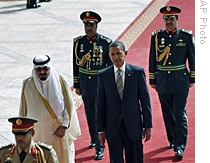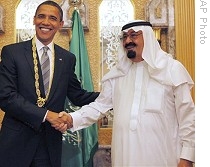Cairo
03 June 2009
 |
| US President Barack Obama walks down the red carpet with Saudi King Abdullah in Riyadh, Saudi Arabia, 03 June 2009 |
In coffee houses and tea-houses in Beirut, Damascus, Baghdad, Riyadh, and Cairo, everyone from intellectuals to the common man seems to be preoccupied with Mr. Obama's visit, and a highly anticipated speech Thursday in Cairo.
The editor-in-chief of the Saudi daily al-Watan, Jamal Kashoggi, says he likes what he sees.
"[The visit] is good news. It is different from what we have had with Bush. Our cartoon, our caricature, tomorrow, in al-Watan tells the story. Obama is being received with flowers and he is saying 'Why they love us,' while George Bush is saying 'Why they hate us.' So, Obama is changing the subject, Obama is not going for confrontation; he is into reaching out to the Muslim world. I think the public in Saudi Arabia is very much welcoming his visit," he said.
 |
| President Barack Obama (L) shakes hands with Saudi King Abdullah bin Abdul Aziz al-Saud after being presented with Order of Merit during bilateral meeting at king's ranch in al-Janadriya, 03 Jun 2009 |
Sudan's government has a long history of bad relations with the United States, and is facing an International Criminal Court arrest warrant for its president, Omar Hassan al-Beshir. But in Khartoum many say they are optimistic about the Obama Mideast visit.
Sudanese eager to hear US president speak
Sidig Turabi thinks most Sudanese are pleased the U.S. president is coming to Cairo and are eager to hear him speak.
"I think that people are very hopeful about his visit, just as would be most Muslims and Arabs, maybe also North Africans, because Sudan is an Afro-Arab country, and well, we are all looking forward to the speech. I am sure many people will be watching this speech and also watching the events after," he said.
But Turabi, the son of veteran Sudanese politician Hassan Turabi, says he is afraid the attitude of the Sudanese government, which he thinks is not favorable to improving relations with Washington, could impact negatively on the opportunities being presented by President Obama's visit.
"We only hope that our governments, some of which are not so favorable by their peoples, are intelligent enough to use the opportunity to gain and create as many win-win situations as possible. We believe that in the Sudan, the government is unnecessarily creating hard conditions for itself and for the new administration in the USA, and we are not very confident that this government is capable of using this good opportunity to make life easier, socially and economically," he said.
In Damascus, Syrians feel left out
In Damascus, top Syrian political analyst Imad Fawzi Shueibi thinks President Obama is trying to demonstrate his administration is different from that of former President George Bush.
"I can only say that this visit is good, because maybe Mr. Obama can say something against the bad reputation of the Bush administration, and maybe he can make a plan for peace in the region," he said.
But Shueibi is disappointed Mr. Obama is visiting Saudi Arabia and Egypt, and not Syria.
"I think that it is a bad choice that he is coming to Saudi Arabia and to Egypt, only. He should come to Syria, too," he added.
Lebanese looking for something new
In Beirut, Haigazian University President Paul Haidostian thinks many Arabs are looking for something fresh and different from Mr. Obama, along the lines of what he promised the American people during the election campaign.
"People would expect President Obama to bring something fresh to show that his perspective and his background, his personal background, and his discussions and talks during his campaign would come true and bring something that is more peaceful, that is more even-handed, that looks at the sufferings of all the peoples of the Middle East and not only part of the issue," said Haidostian.
Haidostian argues that most ordinary people in the Arab world are not looking for solutions to thorny geopolitical issues or matters of state. "Most people are expecting real solutions to the real problems of real people in the Middle East," he concluded.